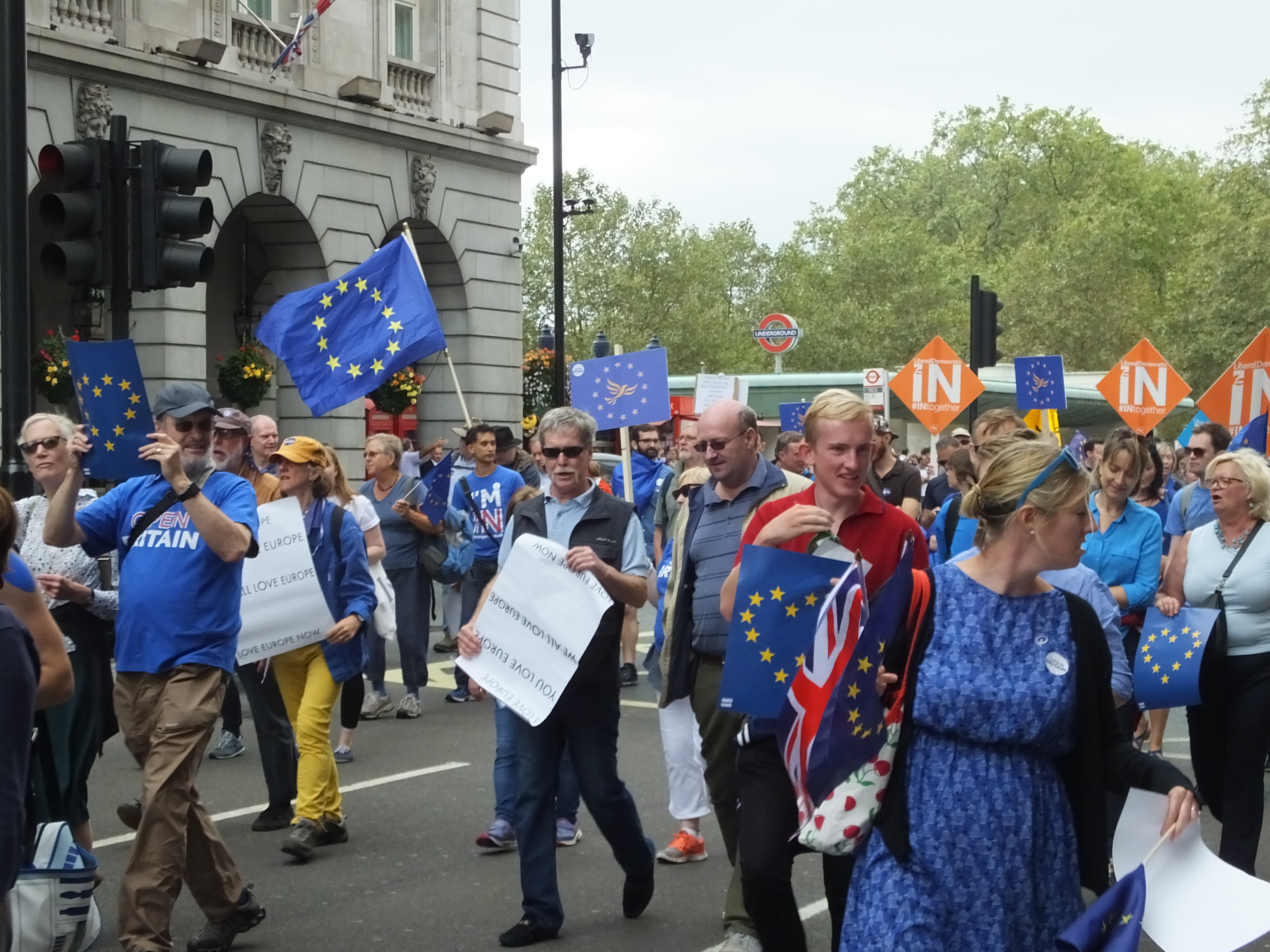On Saturday 25 March, I attended the ‘Unite for Europe’ march to Parliament, along with tens-of-thousands of others. The aim of this march was simple: to make sure the voices of the 48% can be heard as the United Kingdom is carelessly divided and steamrollered into an uncertain ‘hard Brexit’.
Occurring just days after the terrorist attacks in Westminster, the importance of democracy, unity and freedom of expression felt palpable. This is not a divisive ‘REMAINERS VS BREXITEERS’ issue, but rather something which affects us all, British or not. In fact, in November 2016, BMG Research found that many so-called Brexiteers now regret voting to leave the EU (aptly dubbed Bregret). If we had the vote now, BMG’s poll suggests that Remain would win, with a 3% increase in support.
This uncertainty and regret is not surprising, considering how the Leave campaign constantly misinformed the public. For example, the Leave camp promised voters that the NHS would get an extra £350 million a week if Britain left the EU. Just hours after the result was announced, former UKIP-leader and pivotal Leave campaigner, Nigel Farage, admitted live on Good Morning Britain that this was not true. Throughout the referendum, Leave also promised we would stay in the single market, arrogantly assuming that we would be able to take all the benefits of EU free-trade zones without contributing anything back – this was another false promise, one which the Leave campaign had no authority to make.
The march shows that people are angry with all this deceit – I know I am. In spite of this, the atmosphere on this sunny Saturday was full of optimism and hope. After a minute’s silence in memory of the victims of last week’s terror attacks, we set off from Park Lane later than expected due to the overwhelming turnout (some sources claim there were over 100,000 people). As we walked along Whitehall towards Parliament Square, The Beatle’s All You Need Is Love blared out from a rooftop, joining the sounds of booming drums and children blowing as hard as they could on their whistles and toy trumpets.
By 2pm we had made it to Parliament Square, where we were greeted by a panoply of flags of EU states, all billowing gently in the light breeze. To my left was Parliament, which was flooded with
brightly coloured flowers laid out of respect by those of us marching. To my right was the stage, where a diverse group of speakers spent the afternoon assuring us that we were not alone and that change was possible. There was a strong Green Party and Liberal Democrat presence throughout the day, signalling the growing strength of the ‘Progressive Alliance’ seeking to usurp the Tories. Tim Farron and Nick Clegg of the Lib Dems and Jonathon Bartley, co-Leader of the Green Party, all gave compelling talks focussing largely on Theresa May’s baffling obsession with a ‘hard’ Brexit (despite the fact that she has no mandate for this and wasn’t even voted in by the electorate).
Bartley was particularly inspiring, acknowledging that “the politics of hate is taking deep roots” but ultimately insisting that “together, we will shape a different future”. They were joined on stage by the groups ‘Students for Europe’ and ‘Scientists for Europe’ – both stressing the importance of free-movement and collaboration – as well as poet Salena Godden, human rights campaigner Peter Tatchell, and MEP Mary Honeyball, to name a few.
It was Labour MP, David Lammy, who really hit the nail on the head when he bluntly asserted that ‘Brexit was about immigration’. Indeed, what truly saddens me about the Leave campaign’s win is that it seems to be normalising hatred, fear and intimidation. In February 2017, the Press Association released their compilation of hate crime statistics from England and Wales since the referendum. Lincolnshire, the area with the biggest Leave vote, saw hate crimes increase by an eye-watering 59% and it’s a similar story in other parts of the country. I’m sure we’ve all seen those videos circulating online of racist and xenophobic incidents on public transport – this is really happening and it’s the most vulnerable in society who are suffering most.
As a gay man, what especially hurts me is the surge in homophobic attacks since the referendum. Galop, an anti-violence LGBTQ+ charity, found that these kinds of hate crimes increased by 147% during July, August and September 2016, compared to the same period the year before. What changed? Brexit. I therefore applaud David Lammy for bravely telling it as he sees it – we cannot keep walking on egg shells out of fear of offending right-wing extremists. Brexit is not simply about leaving the EU; it is about vindicating racism, xenophobia and homophobia.
The march today, for me at least, was not about moaning because the referendum didn’t go my way. It’s worth remembering, however, that in the run-up to the referendum, Nigel Farage said that a narrow 52-48% win for Remain would be “unfinished business” – surely the same applies to the Leave camp’s narrow victory? Nonetheless, there’ll be some who claim that this protest was somehow an attempt to undermine a supposedly ‘democratic’ decision – I disagree wholeheartedly. To quote a placard I saw on the day, “challenging bad ideas is also part of democracy”. The march was about standing up to this deafening, misinformed hatred and the unjust politics underpinning it. It was about making it clear that we will not allow foreign EU nationals (or UK nationals living abroad in EU states) to be treated by Mrs May as mere bargaining chips. It was about fighting back with facts, reasoning and ultimately with hope for change and unity before too much further damage is done.
Image: Wikimedia Commons

